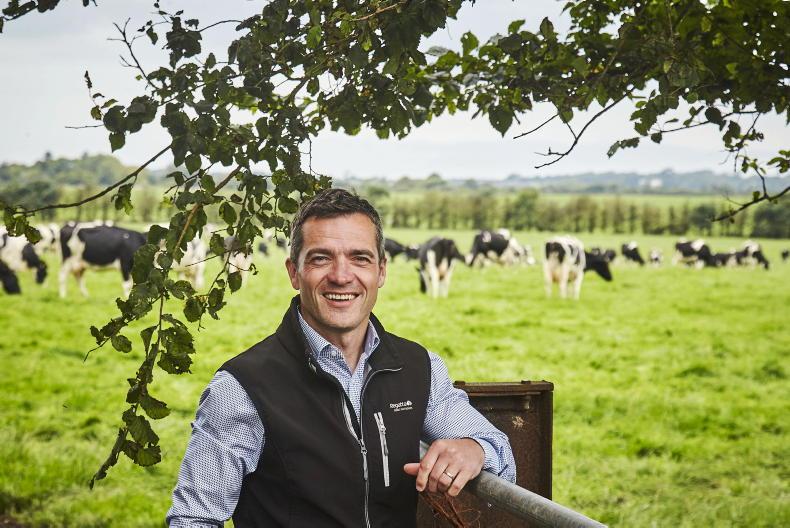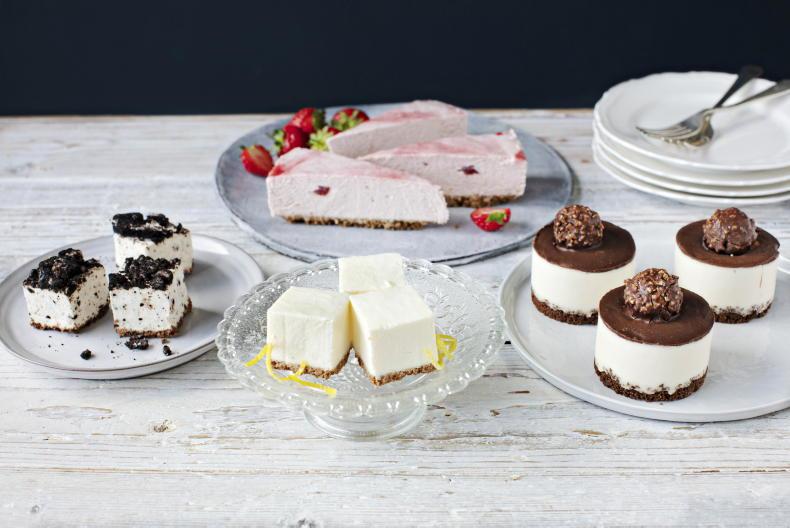Over the last year, the two major events that directly affected the performance of the Irish agri-food sectors were Brexit and COVID-19.
However, while Brexit finally happened in December last year, it is an event that has been in the melting pot for the best part of four years and Irish companies have had some time to prepare for its consequences.
In the case of COVID-19, the opposite was the case. The impact of the COVID-19 virus was swift and brutal, effectively shutting down the global economy in a matter of days. Back in March and April 2020, only the most essential services remained in operation.
And while the food industry did qualify as essential, the impact was not equal for all businesses.
Almost overnight, the retail channel became the only show in town and food companies that depended on the food service market were left stranded.
Food companies like Coolhull Farm.
Based in Co Wexford, Coolhull Farm is a family-owned Irish food business that specialises in premium desserts such as ice cream, cheesecake, mousses, pastries and cakes.
The company was basically down to just three people, and I was practically on my own trying to keep everything going in the factory
However, the business was heavily reliant on the food service channel as a route to market with over 90% of sales to hotels, restaurants, cafés and contract caterers.
The mass shutdown of the food service sector across Europe was devastating for the business.
“Our sales for April last year fell 91% as a result of the first COVID-19 lockdown,” says Barry Murphy, managing director of Coolhull.

Barry Murphy, managing director of Wexford desserts business Coolhull Farm.
“We had to make some very tough decisions early on. Our staff numbers had been heading towards 50 people prior to COVID-19 but we had to let people go temporarily as soon as the virus hit. The company was basically down to just three people, and I was practically on my own trying to keep everything going in the factory,” he adds.
Shock
After the initial shock in March and April, Murphy says business remained very slow in May. This was because any food service operators that were trying to reopen by doing takeaway or click-and-collect still had supply stocks from pre-COVID-19 that they were very slow to get through.
By June, Coolhull was starting to see the first trickles of activity in the food service market but it was inconsistent.
“We started moving some product again in June as some restrictions started to ease but it was very sporadic. We got back to making product maybe one or two days a week.
Then as the country began to reopen in the summer we got back to three days a week and finally back to five days a week as staycations got into full swing,” says Murphy.
While the return of demand was certainly welcome, Murphy says it presented its own challenges for the business.
“Firstly, we had to ensure the correct safety protocols were in place for returning staff, particularly as there tends to be very little space in most food businesses and the virus spreads easily in a cold or chilled environment.”
Having seen our sales collapse in April and May, the summer staycations meant we were suddenly under incredible pressure
The second challenge was to reopen the business from a standing start and ramp up production to meet a surge in demand.
“Having seen our sales collapse in April and May, the summer staycations meant we were suddenly under incredible pressure. We ended up cramming almost half of our turnover for the year into just three months,” says Murphy.
“I have to say the team really came together during that period. They went above and beyond to make sure we got through it,” he adds.
Restrictions
However, the return of restrictions in October meant sales fell off a cliff once more for Coolhull.
Murphy says the brief reopening in December was really important for the business as it brought in some much needed revenue, but overall the company finished 2020 with sales down almost 50% on normal levels.
The country has since spent almost all of the early months of 2021 stuck in Level 5 lockdown restrictions, which has been very difficult for many businesses.
“It’s been a pretty bleak number of months since Christmas but we think one of our roads back will be via the retail channel,” says Murphy.
When COVID-19 first hit last year, Coolhull reached out to supermarkets in a bid to see was there any opportunities there.
It’s taken almost a year but the company has won a number of listings with new products this year.
“We developed a new product which we call our Yummy Cakes range and that’s got us listings with Tesco and SuperValu. It’s going really well but it’s still too early to tell the acceptance level by the consumer,” says Murphy.

Coolhull Farm recently launched a range of ice cream cookie sandwiches.
The company has also recently launched a range of ice cream cookie sandwiches, which are being trialled in a number of retail stores and quick-serve restaurants around the country.
While the business is still taking its first major steps into retail, Murphy believes the frozen dairy category offers lots of opportunities.
Creativity
“If you look at the US, there’s certainly a lot more creativity and variety in the frozen dairy aisle than in Ireland. We think we can rejuvenate the frozen dairy category in Ireland by bringing something different,” he says.
Alongside the push towards retail, Coolhull continues to develop new product solutions for its food service customers that remain open with takeaway, delivery or click-and-collect services.
The company has developed a new ice cream sandwich range, which Murphy says is very easy for restaurant operators to include with meal deals and promotions.
Outside of Ireland, Coolhull has been steadily building its export footprint over recent years.
While the UK is its main export market, Murphy says the business was starting to develop in European markets and had developed relationships with clients in the Netherlands, Germany and other European countries.
It’s still early days but some of these customers are starting to come alive again now that a phased end to restrictions is beginning to take place in most of Europe.
Resilience
Standing back from the day to day, its clear Coolhull Farm has been through a gruelling year. Yet despite all the incredible challenges, the business is still standing and doing everything it can to adapt, pivot, innovate and survive.
Like so many other Irish food businesses, the story of Coolhull over the past year really illustrates the fantastic resilience of the Irish food sector.
There’s not likely to be another year like 2020 in terms of the devastation it wrought on so many businesses. Yet for those that come through to the other side it could be the making of them in the long run.
Over the last year, the two major events that directly affected the performance of the Irish agri-food sectors were Brexit and COVID-19.
However, while Brexit finally happened in December last year, it is an event that has been in the melting pot for the best part of four years and Irish companies have had some time to prepare for its consequences.
In the case of COVID-19, the opposite was the case. The impact of the COVID-19 virus was swift and brutal, effectively shutting down the global economy in a matter of days. Back in March and April 2020, only the most essential services remained in operation.
And while the food industry did qualify as essential, the impact was not equal for all businesses.
Almost overnight, the retail channel became the only show in town and food companies that depended on the food service market were left stranded.
Food companies like Coolhull Farm.
Based in Co Wexford, Coolhull Farm is a family-owned Irish food business that specialises in premium desserts such as ice cream, cheesecake, mousses, pastries and cakes.
The company was basically down to just three people, and I was practically on my own trying to keep everything going in the factory
However, the business was heavily reliant on the food service channel as a route to market with over 90% of sales to hotels, restaurants, cafés and contract caterers.
The mass shutdown of the food service sector across Europe was devastating for the business.
“Our sales for April last year fell 91% as a result of the first COVID-19 lockdown,” says Barry Murphy, managing director of Coolhull.

Barry Murphy, managing director of Wexford desserts business Coolhull Farm.
“We had to make some very tough decisions early on. Our staff numbers had been heading towards 50 people prior to COVID-19 but we had to let people go temporarily as soon as the virus hit. The company was basically down to just three people, and I was practically on my own trying to keep everything going in the factory,” he adds.
Shock
After the initial shock in March and April, Murphy says business remained very slow in May. This was because any food service operators that were trying to reopen by doing takeaway or click-and-collect still had supply stocks from pre-COVID-19 that they were very slow to get through.
By June, Coolhull was starting to see the first trickles of activity in the food service market but it was inconsistent.
“We started moving some product again in June as some restrictions started to ease but it was very sporadic. We got back to making product maybe one or two days a week.
Then as the country began to reopen in the summer we got back to three days a week and finally back to five days a week as staycations got into full swing,” says Murphy.
While the return of demand was certainly welcome, Murphy says it presented its own challenges for the business.
“Firstly, we had to ensure the correct safety protocols were in place for returning staff, particularly as there tends to be very little space in most food businesses and the virus spreads easily in a cold or chilled environment.”
Having seen our sales collapse in April and May, the summer staycations meant we were suddenly under incredible pressure
The second challenge was to reopen the business from a standing start and ramp up production to meet a surge in demand.
“Having seen our sales collapse in April and May, the summer staycations meant we were suddenly under incredible pressure. We ended up cramming almost half of our turnover for the year into just three months,” says Murphy.
“I have to say the team really came together during that period. They went above and beyond to make sure we got through it,” he adds.
Restrictions
However, the return of restrictions in October meant sales fell off a cliff once more for Coolhull.
Murphy says the brief reopening in December was really important for the business as it brought in some much needed revenue, but overall the company finished 2020 with sales down almost 50% on normal levels.
The country has since spent almost all of the early months of 2021 stuck in Level 5 lockdown restrictions, which has been very difficult for many businesses.
“It’s been a pretty bleak number of months since Christmas but we think one of our roads back will be via the retail channel,” says Murphy.
When COVID-19 first hit last year, Coolhull reached out to supermarkets in a bid to see was there any opportunities there.
It’s taken almost a year but the company has won a number of listings with new products this year.
“We developed a new product which we call our Yummy Cakes range and that’s got us listings with Tesco and SuperValu. It’s going really well but it’s still too early to tell the acceptance level by the consumer,” says Murphy.

Coolhull Farm recently launched a range of ice cream cookie sandwiches.
The company has also recently launched a range of ice cream cookie sandwiches, which are being trialled in a number of retail stores and quick-serve restaurants around the country.
While the business is still taking its first major steps into retail, Murphy believes the frozen dairy category offers lots of opportunities.
Creativity
“If you look at the US, there’s certainly a lot more creativity and variety in the frozen dairy aisle than in Ireland. We think we can rejuvenate the frozen dairy category in Ireland by bringing something different,” he says.
Alongside the push towards retail, Coolhull continues to develop new product solutions for its food service customers that remain open with takeaway, delivery or click-and-collect services.
The company has developed a new ice cream sandwich range, which Murphy says is very easy for restaurant operators to include with meal deals and promotions.
Outside of Ireland, Coolhull has been steadily building its export footprint over recent years.
While the UK is its main export market, Murphy says the business was starting to develop in European markets and had developed relationships with clients in the Netherlands, Germany and other European countries.
It’s still early days but some of these customers are starting to come alive again now that a phased end to restrictions is beginning to take place in most of Europe.
Resilience
Standing back from the day to day, its clear Coolhull Farm has been through a gruelling year. Yet despite all the incredible challenges, the business is still standing and doing everything it can to adapt, pivot, innovate and survive.
Like so many other Irish food businesses, the story of Coolhull over the past year really illustrates the fantastic resilience of the Irish food sector.
There’s not likely to be another year like 2020 in terms of the devastation it wrought on so many businesses. Yet for those that come through to the other side it could be the making of them in the long run.









 This is a subscriber-only article
This is a subscriber-only article












SHARING OPTIONS: